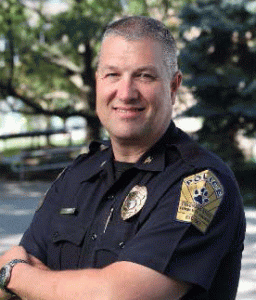 WELCOME TO STEP!
WELCOME TO STEP!
As a Chief of Police, I know first line supervisors have a difficult but impactful position within law enforcement agencies. As you know, this is due to the difficult path they must navigate between line personnel and senior leaders within organizations. The Supervisors Training and Education Program (STEP) was designed to provide first line supervisors the leadership capacity to successfully complete this important work.
Ultimately, well-trained and highly developed leaders are more successful and have greater impacts on organizations. STEP enhances this by immersing supervisors into nineteen (19) highly focused training modules designed to develop first line leaders. These topics are taught by subject matter experts that facilitate in-depth discussions, focused classroom work, and projects designed to challenge 21st century leaders.
In order to ensure the STEP curriculum remains relevant, it is continuously being reviewed and revised by the STEP committee. In addition, to ensure we understand the perspective of first line leaders, a member from each class joins the committee to share feedback and provide guidance from the graduating class.
In short, STEP provides supervisors with practical and relevant leadership training that can be easily applied, while aligning new leaders with a professional development pathway that ensures future success.
Chief Sean T. Asbury, CLEE
What is STEP?
The Supervisor Training and Education (STEP) program was implemented in 2004 to assist recently promoted officers in making the transition to first line supervisor. This transition is generally recognized to be among the most difficult challenges in a law enforcement professional’s career. As officers enter the position of supervisor, they must change and adapt to meet the new position and organizational requirements. Through 2024, 978 first line supervisors have completed STEP.
Many chiefs of police in Ohio had expressed the concern that newly promoted officers have trouble changing their mindset from being an “”officer” to being a “supervisor of officers.” This transition requires the new supervisor to recognize that they must now get the work completed though other people. There may be a tendency to want to be liked by their new direct reports and to avoid accountability for responsibilities. These types of behaviors may place the department and community at risk if they go unchecked.
The STEP planning committee identified three rationales for a first line supervisor training and education program in Ohio. The rationales may be viewed as a response to reduce risk to the agency and improve the effectiveness and efficiency of service to the community.
A program is needed to accelerate the development of the new supervisor in the critical first few months on the job. Important here is providing the participant, up front, with those survival skills necessary in the six months as a new supervisor. Also important is hastening an understanding of the expectations and role of the supervisor in the overall department.
A supervisor development program is needed to first assess and then narrow the performance gap between “where the individual is” and “where the individual ought to be.”
A first line supervisor development program is needed in Ohio to complement the continuum of professional development management and leadership programs now offered by the Law Enforcement Foundation via PELC and CLEE. STEP is the first step toward developing future upper command staff and chiefs of police in Ohio.
Training Modules:
Transition to Supervisor
FLS 360 Instruction
Creating an Ethical Environment
Effective Listening and Speaking
Effective Supervisory Response to Domestic Violence Calls
Supervisory Response to Foot and Vehicle Pursuits
Effective Written Communication for Supervisors
Administrative Skills
Performance Management
Managing Difficult Employees
Development of Subordinates: Counseling and Coaching
Mentoring and Emotional Intelligence
Leading and Managing Patrol Operations
Career Development Part 1
Media Relations 101
Risk Management for Supervisors
Critical Incident Management
The Impact of Artificial Intelligence for First Line Supervisors
Conflict Management
FLS 360-degree feedback
Officer Wellness: Law Enforcement Perspective
Officer Wellness: Treatment Perspective
Officer Wellness: OSU Terror Attack
Career Development Part 2
Practical Case Studies
Team Presentations
Contemporary Issues in Law Enforcement Panel
Our Instructors
Committee & Staff
Chair: Chief Sean Asbury, CLEE – Columbus State Community College PD
Lt. Roman Brandau – Athens PD
Chief Kevin Chittenden – Wauseon PD
Sgt. Patrick Fairhurst – Tallmadge PD
Chief Steven Hurd, CLEE – Eaton PD
Det. Brett Marrs – Piqua PD
Det. Ken Patterson – South Euclid PD
Lt. Doug Stephens, CLEE – Westerville PD
Chief Charles Stiegelmeyer, CLEE – Miami Twp. PD
Sgt. Dana Taggart – Sharonville PD
Deputy Chief Justin White, CLEE – Bowling Green PD
Mallory Murphy, Program Director
614-761-4618
mallory.murphy@oacp.org
Renea Collins, Program Coordinator
614-761-9479
renea.collins@oacp.org
Location & Cost
Training Location:
Embassy Suites Dublin
5100 Upper Metro Place
Dublin OH 43017
614-790-9000
Training Cost:
The student tuition charged to local law enforcement agencies is *$2,250. Participants will also need to cover costs for lodging, breakfast and dinner.
*Subject to change.

